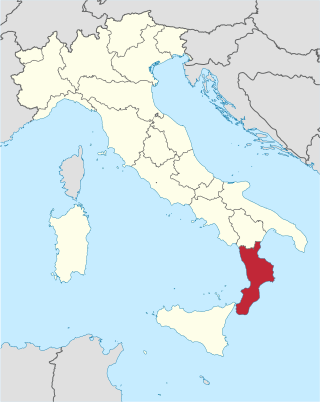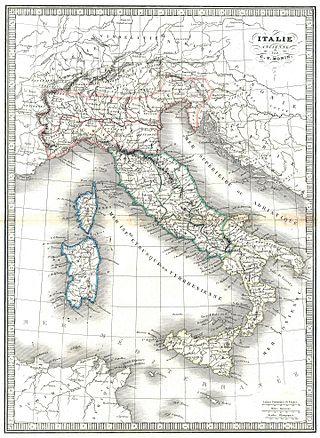Apulia and Calabria (Latin : Apulia et Calabria) was a Late Roman province in the ancient territories of Apulia and Calabria (both included in the modern Apulia region, in southern Italy). Its capital was Canusium (modern Canosa di Puglia).
Apulia and Calabria (Latin : Apulia et Calabria) was a Late Roman province in the ancient territories of Apulia and Calabria (both included in the modern Apulia region, in southern Italy). Its capital was Canusium (modern Canosa di Puglia).

Calabria is a region in Southern Italy. It is a peninsula bordered by Basilicata to the north, the Ionian Sea to the east, the Strait of Messina to the southwest, which separates it from Sicily, and the Tyrrhenian Sea to the west. It has almost 2 million residents across a total area of 15,222 km2 (5,877 sq mi). Catanzaro is the region's capital.

Apulia, also known by its Italian name Puglia, is a region of Italy, located in the southern peninsular section of the country, bordering the Adriatic Sea to the east, the Strait of Otranto and Ionian Sea to the southeast and the Gulf of Taranto to the south. The region comprises 19,345 square kilometers (7,469 sq mi), and its population is about four million people. It is bordered by the other Italian regions of Molise to the north, Campania to the west, and Basilicata to the southwest. The regional capital is Bari.

Robert Guiscard, also referred to as Robert de Hauteville, was a Norman adventurer remembered for his conquest of southern Italy and Sicily in the 11th century.

Lucania was a historical region of Southern Italy, corresponding to the modern-day region of Basilicata. It was the land of the Lucani, an Oscan people. It extended from the Tyrrhenian Sea to the Gulf of Taranto. It bordered with Samnium and Campania in the north, Apulia in the east, and Bruttium in the south-west, and was at the tip of the peninsula which is now called Calabria. It comprised almost all the modern region of Basilicata, the southern part of the Province of Salerno, the western part of Province of Taranto and a northern portion of the Province of Cosenza.

Griko, sometimes spelled Grico, is one of the two dialects of Italiot Greek, spoken by Griko people in Salento, province of Lecce, Italy. Some Greek linguists consider it to be a Modern Greek dialect and often call it Katoitaliótika or Grekanika (Γραικάνικα). Griko and Standard Modern Greek are partially mutually intelligible.

Salento, is a cultural, historical, and geographic region at the southern end of the administrative region of Apulia, in southern Italy. It is a sub-peninsula of the Italian Peninsula, sometimes described as the "heel" of the Italian "boot". It encompasses the entire administrative area of the Province of Lecce, Taranto, and a majority of the Province of Brindisi.

The Gulf of Taranto is a gulf of the Ionian Sea, in Southern Italy.

Italia, also referred to as Roman Italy, was the homeland of the ancient Romans. According to Roman mythology, Italy was the ancestral home promised by Jupiter to Aeneas of Troy and his descendants, Romulus and Remus, who were the founders of Rome. Aside from the legendary accounts, Rome was an Italic city-state that changed its form of government from Kingdom to Republic and then grew within the context of a peninsula dominated by the Gauls, Ligures, Veneti, Camunni and Histri in the North, the Etruscans, Latins, Falisci, Picentes and Umbri tribes in the Centre, and the Iapygian tribes, the Oscan tribes, and Greek colonies in the South.

Longobardia was a Byzantine term for the territories controlled by the Lombards in the Italian Peninsula. In the ninth and tenth centuries, it was also the name of a Byzantine military-civilian province known as the Theme of Longobardia located in southeastern Italy.

Salentino is a dialect of the Extreme Southern Italian spoken in the Salento peninsula, which is the southern part of the region of Apulia at the southern "heel" of the Italian peninsula.

The County of Sicily was a Norman state comprising the islands of Sicily and Malta and part of Calabria from 1071 until 1130. The county began to form during the Norman conquest of Sicily (1061–91) from the Muslim Emirate, established by conquest in 965. The county is thus a transitional period in the history of Sicily. After the Muslims had been defeated and either forced out or incorporated into the Norman military, a further period of transition took place for the county and the Sicilians.

Greeks in Italy have been present since the migrations of traders and colonial foundations in the 8th century BC, continuing down to the present time. Nowadays, there is an ethnic minority known as the Griko people, who live in the Southern Italian regions of Calabria and Apulia, especially the peninsula of Salento, within the ancient Magna Graecia region, who speak a distinctive dialect of Greek called Griko. They are believed to be remnants of the ancient and medieval Greek communities, who have lived in the south of Italy for centuries. A Greek community has long existed in Venice as well, the current centre of the Greek Orthodox Archdiocese of Italy and Malta, which in addition was a Byzantine province until the 10th century and held territory in Morea and Crete until the 17th century. Alongside this group, a smaller number of more recent migrants from Greece lives in Italy, forming an expatriate community in the country. Today many Greeks in Southern Italy follow Italian customs and culture, experiencing assimilation.

The etymology of the name of Italy has been the subject of reconstructions by linguists and historians. Considerations extraneous to the specifically linguistic reconstruction of the name have formed a rich corpus of solutions that are either associated with legend or in any case strongly problematic.

The County of Apulia and Calabria, later the Duchy of Apulia and Calabria, was a Norman state founded by William of Hauteville in 1043, composed of the territories of Gargano, Capitanata, Apulia, Vulture, and most of Campania. It became a duchy when Robert Guiscard was raised to the rank of duke by Pope Nicholas II in 1059.

The Griko people, also known as Grecanici in Calabria, are an ethnic Greek community of Southern Italy. They are found principally in the regions of Calabria and Apulia. The Griko are believed to be remnants of the once large Ancient and Medieval Greek communities of Southern Italy, although there is some dispute among scholars as to whether the Griko community is directly descended from Ancient Greeks, from more recent medieval migrations during the Byzantine period, or a combination of both.
The Italo-Dalmatian languages, or Central Romance languages, are a group of Romance languages spoken in Italy, Corsica (France), and formerly in Dalmatia (Croatia).

Italiot Greek, also known as Italic-Greek, Salentino-Calabrian Greek or Apulia-Calabrian Greek, is a pair of varieties of Modern Greek spoken in Italy by the Griko people.
The following is a timeline of the history of the city of Reggio Calabria, Italy.